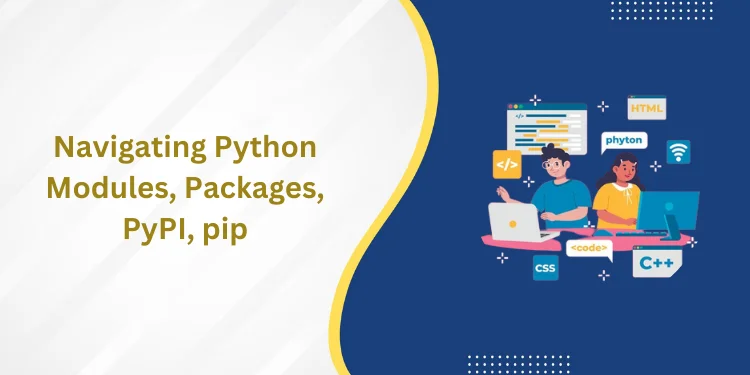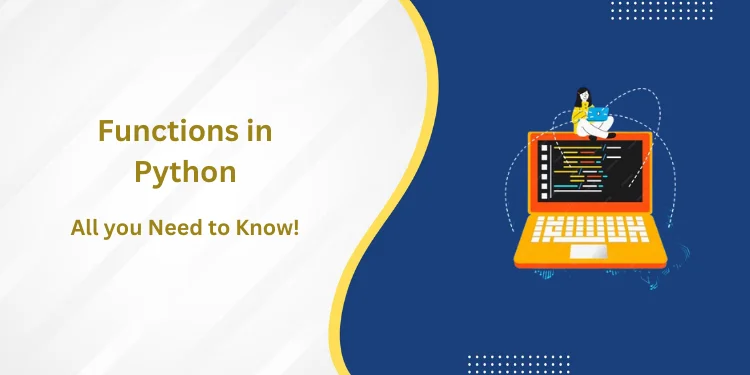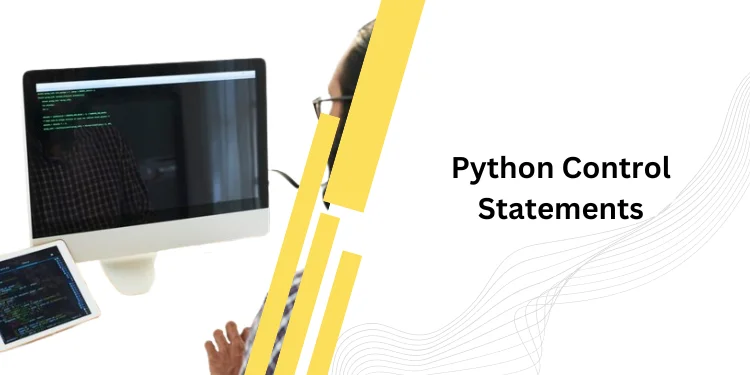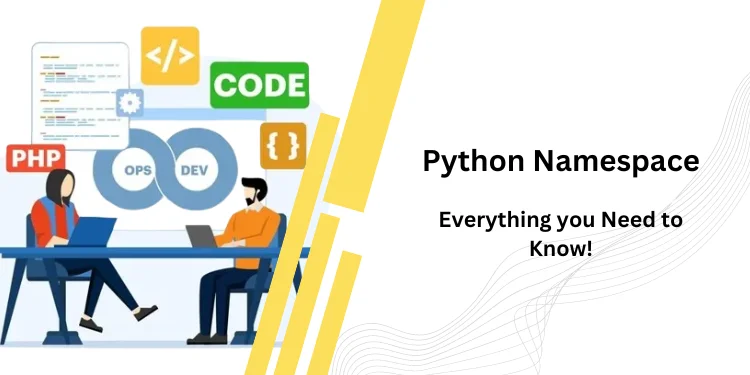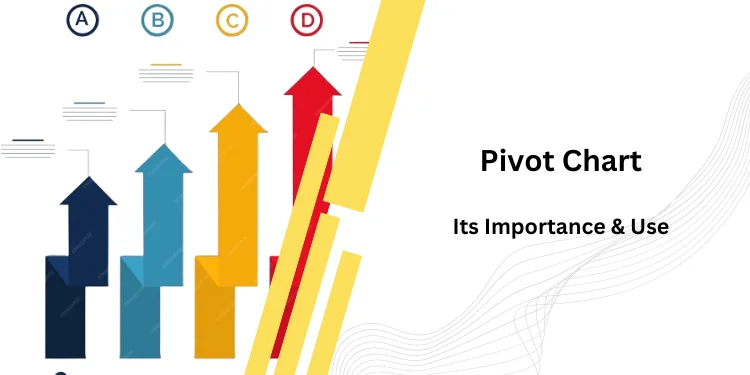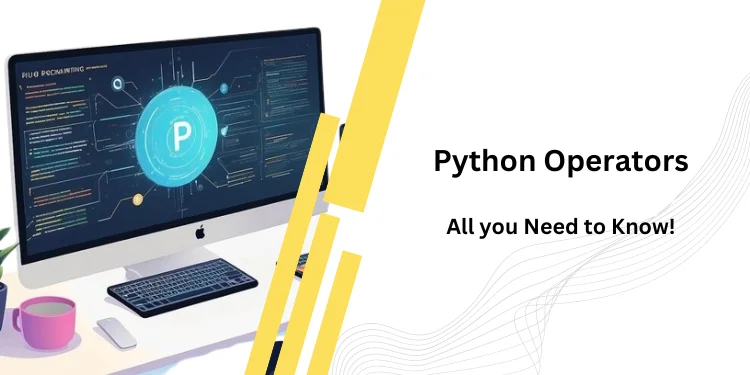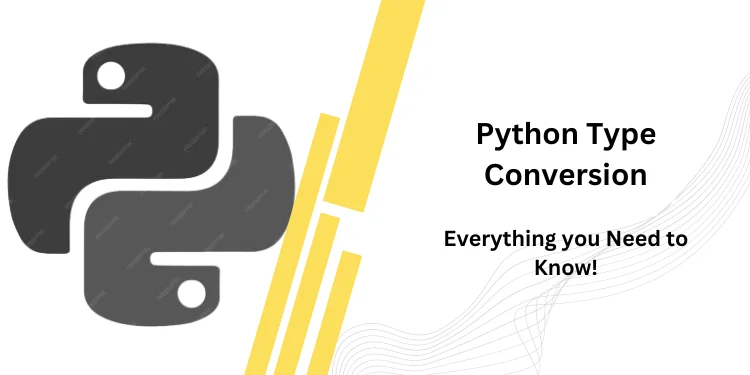Introduction to Data Analyst at Accenture
Ever wonder what is the role of a Data Analyst in companies? If yes, then good for you but if no then this blog is for you. This blog also caters to how to become a data analyst at Accenture.
Organizations across all sectors are increasingly relying on data to make crucial business choices, such as which new products to create, which markets to enter, which investments to make, and which new (or current) consumers to target. Data is also used to highlight inefficiencies and other business issues that must be addressed.
The data analyst at Accenture task in these companies is to provide a numerical value to these critical business operations so that performance can be measured and compared across time. However, the position entails more than simply looking at numbers: an analyst must also understand how to use data to help a business make better educated decisions.
A job in analytics is a fantastic choice because data has become an important aspect of any industry in order to make strategic and educated decisions. As a result, the demand for data analysts rises, making it one of the top employment options.
Accenture is one of the world’s largest consulting organizations, with over 323K employees, offices and operations in over 200 cities across 56 countries, and net revenues of $30.0 billion in fiscal 2014. Accenture has clients in every industry and numerous government agencies. 89 of the Fortune Global 100 and more than three-quarters of the Fortune Global 500 are Accenture clients.
Accenture is separated into five industry groupings known as “operation units,” which are further divided into 19 industry groups.
Accenture is a highly layered organization. Another approach to look at the company is through its four “growing platforms,” which mirror the kind of services it provides:
- Strategy [includes company strategy, operational strategy, and information technology strategy]
- Digital [Digital marketing, analytics, big data, mobile computing, and so forth]
- Technology [systems integration, technology consultancy, information technology outsourcing]
- Operations [industry consulting and functional outsourcing – such as HR, procurement, finance, and so on]
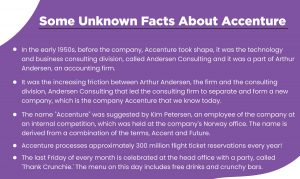
Watch This: Cracking Data Analyst Interview at Accenture
Skills and Requirements for Data Analyst at Accenture
Data Analyst at Accenture jobs vary from one company to the next. Anyone pursuing a degree in Data Analytics at Accenture or graduating from another subject must have basic knowledge of a few programming languages, data mining tools, and testing systems can apply for Data Analyst at Accenture.
- A bachelor’s degree in a quantitative discipline is required (Economics, Engineering, Computer Science, Math, Statistics)
- 1-2 years of analytics or management consulting expertise
- SQL proficiency and accessing relational databases
- At least one statistical programming language experience (SAS, R, Python)
- At least one data visualization tool experience (Spotfire,Tableau, Qlikview)
- Project management experience is required.
- Understanding of spreadsheet applications such as Google Sheets and Excel.
Interview Process for Data Analyst at Accenture
Data Analyst at Accenture interviews are divided into three rounds; this is not a project-specific hiring or managerial acquisition.
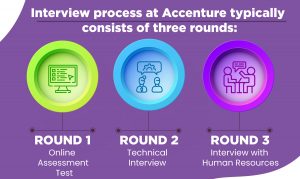
First stage of Data Analyst at Accenture interview is Resume Sorting.
Your resume and cover letter are delivered directly to the recruiter, who compares the CV to the advertised job description and the prerequisites to the candidate’s qualifications for Data Analyst at Accenture.
If your resume is a match for the post for Data Analyst at Accenture, you will be scheduled for an initial screening interview, and the Accenture team will contact you directly. If your resume was not a good fit, you will be contacted by email. The Data Analyst at Accenture Recruitment team will keep your information on file for future opportunities at the organization.
What do recruiters look for in resumes for Data Analyst at Accenture positions?
- Relevant work experience is defined as experience (preferably 1-2 years) that corresponds to the post for which you have applied.
- Number of previous projects you have managed or been a part of
- Statistical Understanding (helps to have a strong stats-math background)
- SQL, R, and Python proficiency
- Whether or whether the resume is brief and to the point
- Background in Education (helps to be from STEM background)
Then comes the second stage of Data Analyst at Accenture i.e., Aptitude, Verbal ability and Writing skills.
This round of Data Analyst at Accenture is divided into three sections: analytical aptitude, verbal ability, and attention to detail. Each candidate is given 55 questions to answer in 60 minutes. These questions put your grasp of the English language, logical reasoning, and analytical skills to the test.
Then comes the most important round for Data Analyst at Accenture i.e., Technical Round
There is no set pattern for the questions the panel can ask. You will be questioned on all of the hard talents listed on your résumé, as well as a few riddles. A few functional problems, such as completing a Bubble sort, Binary Search, or Insertion Sort, will also be used to test the technical elements.
During the Data Analyst at Accenture interview, candidates with a CS educational background will be expected to create code.
This round’s questions are largely based on key programming topics like C++, Java, Python, and SQL. As a result, you should be prepared with Data Structures and Algorithms, Operating Systems, and your preferred programming language.
Candidates who can back up their abilities and answer the majority of the tough puzzle questions correctly advance to the next stage.
The Last round for Data Analyst at Accenture interview is HR and Behavioral round.
The interviewers will evaluate your soft skills in this round. They will ask you about your current employer and role (if any), or they will ask you to tell them about yourself (the standard “Tell me about yourself” prompt).
This is the round in which you will explain your previous experience and why you want to join Data Analyst at Accenture. The main point here is to describe projects in detail, emphasizing your participation in their successful completion. Basically, the panel will go deep into your resume in this round, so be prepared to back up whatever you’ve included there.
Before applying for a position for data analyst at Accenture, a recent graduat
e should have completed a few internships and projects. Then, this phase becomes much more about your projects, as well as your industry knowledge and level of programming language expertise.
Here are some frequently asked questions for Data Analyst at Accenture:
- Please tell me about yourself.
- Why do you become a data analyst at Accenture?
- How do you envision yourself in five years?
- What are your strong points and weak points?
- Resume questions about hard talents and portfolio
- Internship/previous project questions
Also Read: Amazon Data Scientist
Data Analyst at Accenture Interview Questions
Interview Questions for Data Analyst at Accenture, First Round:
- This train travels from Delhi______ Orissa.
- At
- To
- Over
- below
- Catching the earlier train will give us the __________ to do some shopping for the home.
- Chance
- Possibility
- Occasion
- Luck
- Alina was punished for___________ her official work
- Slowing
- Avoiding
- Postponing
- Shrinking
- Cat spilled__________ milk all over the floor.
- AN
- A
- The
- None of the above.
- I have been working here______________ five years.
- Since
- From
- For
- None of the above.
- I have been working here______________ five years.
- Since
- From
- For
- None of the above.
- The sun rose________________ the horizon in the east.
- Over
- Above
- In
- Below
- Rohan will be there ___________ Sunday and Monday.
- For
- Until
- During
- After
Technical Questions for Data Analyst at Accenture:
- What is the purpose of the Java keyword “static”?
- In Java, the static keyword is a non-access modifier that can help with memory management.
- Static properties can be shared by all objects; no distinct copies of static members are made when an object is formed.
- There is no need to construct an instance of the class to access static members; we can simply use the class name.
- Is it possible to implement numerous interfaces in a single Java class?
Yes, many interfaces can be implemented in a single class. Multiple inheritances in Java are achieved by implementing multiple interfaces into the class. During implementation, each interface name is separated by a comma(,).
- What is the significance of the Java keywords “super” and “this”?
The “super” keyword is used in Java to provide a reference to the instance of the parent class (superclass). It cannot be used as an identifier in Java since it is a reserved keyword. This keyword can also be used to call constructors and methods in parent classes.
this Keyword: In Java, the keyword “this” refers to the current class’s instance. It cannot be used as an identifier in Java since it is a reserved keyword. It can be used to refer to an object of the current class, to invoke a function Object() { [native code] } of the current class, to pass as an argument in a method call or function Object() { [native code] } call, and to return the current class’s object.
- What is run-time polymorphism, and how does it work in Java?
Run-time polymorphism (dynamic binding or dynamic method dispatch) means that calls to overridden methods are resolved dynamically during run-time rather than compile-time.
In Java, method overriding is used to achieve run-time polymorphism. Method overriding occurs when a child class (subclass) has the same method name, return type, and parameters as the parent (superclass), and that method overrides the superclass method.
Example:
The sample below contains one superclass, Animal, and three subclasses, Birds, Mammals, and Reptiles. Subclasses expand the superclass by overriding the superclass’s print() function. We will invoke the print() method using the reference variable of the Animal class, i.e., the parent class. The subclass method is called during runtime because it refers to the subclass object, and the subclass method overrides the superclass method. It is run-time polymorphism since the Java Virtual Machine (JVM) determines method invocation.
|
class Animal{ void print(){ System.out.println(“Inside Animal”); } } class Birds extends Animal{ void print(){ System.out.println(“Inside Birds”); } } class Mammals extends Animal{ void print(){ System.out.println(“Inside Mammals”); } } class Reptiles extends Animal{ void print(){ System.out.println(“Inside Reptiles”); } } class InterviewBit{ public static void main(String args[]){ Animal a = new Animal(); Animal b = new Birds(); //upcasting Animal m = new Mammals(); //upcasting Animal r = new Reptiles(); //upcasting a.print(); b.print(); m.print(); r.print(); } } |
- Differentiate between Java’s Array and Array List.
- What is Java’s “Diamond problem”?
The “Diamond dilemma” is most commonly seen in numerous inheritances. Because Java does not enable multiple inheritances, the diamond problem comes when attempting to implement several interfaces. When two interfaces with methods with the same signature are implemented in a single class, the compiler is unsure which function to run, resulting in a compile-time error. Because its structure
resembles that of a diamond, it is known as a “Diamond problem.”
If we try to access the print() function using the DerivedClass3 object, the compiler will be confused as to which copy of the print() function it should call, DerivedClass1 or DerivedClass2.
Virtual inheritance is used to overcome the “Diamond problem.” It ensures that the child class will only receive one instance of the common base class.
- How do you tell the difference between C, C++, and Java?
- In Java, what are lambda expressions?
- A Lambda expression is a function that can be constructed independently of any class. It first appeared in Java 8.
- Its purpose is to give an interface implementation with a functional interface. It is not necessary to redefine the method in order to provide the implementation; simply provide the implementation code. As a result, it saves a lot of coding.
- Because a lambda expression is seen as a function, the compiler does not generate a.class file.
- They are typically used to build basic callbacks or event listeners, or in functional programming with the Java Streams API.
- Lamda Expression Syntax is:
Three components of Lmada expression are:
- argument_list: Zero or more number of arguments.
- -> (arrow-token): Used to link argument_list and body of lambda expression.
- body : contains statement and expression for lambda expression.
9. Can you tell the difference between “var++” and “++var”?
The expressions “var++” and “++var” are used to increase the value of the variable “var.”
“var++” will first evaluate the expression and then increase its value by one, which is known as post-incrementation of a variable. “++var” will increase the value of the variable by one before evaluating the expression; this is known as variable pre-incrementation.
Example:
- Describe the memory allocation procedure in C.
Memory allocation refers to the process of reserving a portion of the memory space based on the needs of the code execution.
In C, memory allocation is done in two ways:
Static memory allocation refers to the memory allocation that occurs at the start of the programme. The allocated memory size remains fixed with this sort of memory allocation, and it is not permitted to change the memory size during run-time. For memory management, it will employ a stack.
Dynamic memory allocation refers to memory allocation that occurs during the execution of a programme. We can provide the size at runtime if necessary. It will manage memory using the heap data structure. Heap memory can be used to allocate and deallocate the required memory space. It is mostly found in pointers. The following are four types of predefined functions that are used to dynamically allocate memory:
Here are some other commonly asked technical questions for Data Analyst at Accenture:
- Create a C++ application to generate the Fibonacci sequence.
- Explain how to use the getch() method in a C++ programme. What makes it different from the getche() function?
- What is the turnaround and response time? (OS)
- What exactly is the AVL tree? What is the importance of this?
- What are the choices for ON DELETE CASCADE in a database table?
- Can you tell the difference between “Hot Backup” and “Cold Backup” in the database?
- Why do we employ database management systems?
- What is the DML command in a database management system?
- Can you tell the difference between the SQL commands DELETE and TRUNCATE?
- Can you tell the difference between CHAR and VARCHAR2?
- What is XML in relation to DBMS? What are its several types? Explain the terms “primary key,” “foreign key,” and “UNIQUE key” in relation to databases.
- What exactly is normalization? What are the different kinds? 1) What exactly do you mean by “data structure”?
Data Analyst at Accenture interview questions for HR round.
The HR round is the final stage of data analyst at Accenture recruitment process. During this phase, the interviewer assesses the candidate’s communication and professional skills.
A list of the most often asked HR questions in data analyst at Accenture, including examples:
1) Can you tell me about yourself in one minute?
“The first impression is the last impression,” as the saying goes, is a wonderful fit for this question. In most circumstances, it will be the first question asked during an HR interview, and you will have the opportunity to impress the interviewer with your perfect and enthusiastic response.
a.) The question’s purpose:
Before you answer, you need understand why this is the first question and why it is asked. So, by asking this question, the interviewer begins the dialogue, and his goal is to determine whether the candidate is suited for the work and job environment by learning as much as possible about the individual.
b.) How to Respond to This Question:
Now, consider how you can meet the expectations for this inquiry. So, before answering this question, you must first be confident and comfortable, and then begin answering.
The flow of the solution to this question is as follows:
- Introduce Yourself: The first sentence should be a very professional introduction to yourself. The interviewer is just interested in learning about you, so focus and be precise.
- Regarding your academics and prior experience (if any): After introducing yourself, the next step is to provide the interviewer with basic information about your academics and previous experience so that the interviewer can determine whether you meet the basic employment criteria or not. So merely provide an outline of your recent academics and experience, not the entire tale.
- (Optional) Family history: It is entirely optional to discuss your family history. If the interviewer provided you enough time to introduce yourself, you may do so; otherwise, it is not required.
- Hobbies, strengths, and objectives: This is your second opportunity to impress the interviewer. But the most crucial aspect of this stage is to be genuine or sincere, which means you should not brag about yourself.
- Now, finish the answer with a smile and ready to answer the next question.
2) What motivated you to apply for the position of Data Analyst at Accenture?
This is the next key question that can increase your chances of being chosen. So, in this question, the interviewer simply wants to know if you are familiar with the organization and your function within it. The first thing you should remember is that you must be well-versed in both the organization and the role for which you have applied.
How to Respond:
To respond to this question, try to connect your skills to the job description. The interviewer is looking for candidates who are knowledgeable about the role for which they have applied. Tr
y to give the interviewer some excellent things about the company and show interest in yourself with those points about the organization.
3) Tell me about your preparation for this interview (Data Analyst at Accenture).
Nobody expects the interviewer to inquire about preparation tactics when they are prepared for an interview, therefore we are trapped with this question. However, there are some pointers for dealing with such inquiries.
By asking this question, the interviewer is attempting to determine how earnest and serious you are about this job opportunity, therefore respond in this manner exclusively.
How to Respond:
There are various things you should take in mind while answering this question, which are listed below:
- Attempt to guarantee that the interview that you have sought is about the company’s profile as well as its products and services.
- Respond as if you were genuinely interested in this interview and, as a result, researched and prepared for the technical and aptitude rounds.
- Tell about the excellent aspects of the organization, as well as any suggestions for improvement (in a positive way)
4) What is your proudest achievement to date?
This is an intriguing interview question since the interviewer wants to know everything about you. The interviewer wants to know the following by asking this question:
- What inspires you to be creative in your daily life?
- What motivates you?
- What is truly important to you in life, and what motivates you?
- What is your capacity?
How to Respond in your Data Analyst at Accenture:
This question should be answered in a way that piques the attention of the interviewer. So, here are several options for answering this question:
- Keep your response genuine by only mentioning accomplishments that you are proud of.
- Keep it current, which means telling about your most recent accomplishment.
- Maintain a professional demeanor. For your success, your response should be professional.
5) How well do you know our company?
This is a pretty likely question for most interviewers. The interviewer wants to check two things in the candidate with this question:
- Do candidates care about the firm and his role? This indicates that they want a candidate who is passionate about the company and does not want any applicant who comes into the interview without knowing anything about the company.
- Whether or not the candidate is a good researcher. They also wanted to see how a prospect searched for the company and in what detail.
How to Respond:
Only you will be able to answer this question if you have sufficient knowledge and have already investigated the company profile. While answering this question, you must include the following points:
- What are they well-known for?
- How many workers do they have?
- How many countries are they located in?
- Who is the company’s founder and CEO?
Data Analyst at Accenture Interview Preparation Tips
The Data Analyst at Accenture interview is designed to assess your ability to think, code, and solve problems. The Data Analyst at Accenture technical interview phase may appear difficult at first, but with proper preparation, you may easily pass it.
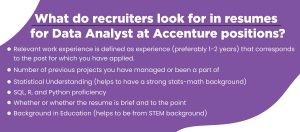
The following are some pointers to help you succeed in your Data Analyst at Accenture interview:
- Learn all the concepts: If you want to ace the technical interview at Accenture, you must first learn about coding, algorithms, data structures, and so on. Focus on algorithm-based and system design problems when preparing for and rehearsing for the interview.
- Enhance your problem-solving abilities: You will be able to solve any type of difficulty with enough practice. This precise talent can only be honed by answering questions every day and modifying the way you perceive and approach every given topic.
- Clear up any confusion: Join some relevant online forums or use any valuable resources to clear your worries before the interview. You should be well-prepared to answer any question that comes your way during the interview.
- Practice mock interviews: Try practicing with mock interviews, which will essentially assist you gain feedback on areas where you need to improve. Mock interviews will also enhance your confidence for the real thing.
- Maintain your cool: During the interview, you must maintain your cool. Take your time to fully comprehend the questions posed to you. If necessary, attempt to plan out a strategy before diving into any coding problems.
- Ask questions: At the end of the interview, you should be prepared to ask the interviewer questions. This will undoubtedly demonstrate your interest in the organization and the position for which you are seeking.
Data Analyst at Accenture Salary
The annual compensation for an Accenture Data Analyst is Rs. 5,85,655. Accenture Data Analyst salaries range from Rs. 1,28,483 to Rs. 50,62,649. This estimate ibs based on 233 Accenture Data Analyst salary report(s) submitted by employees or calculated using statistical methods. A Data Analyst at Accenture can expect to earn an average total pay of 6,00,000 after bonuses and other perks. See all Data Analyst salaries to see how this compares to the market.
Conclusion
Accenture is one of the world’s leading Fortune 500 businesses, with sales and profitability that outperform the majority of MNCs. It is also well-known for having a diversified and strong work culture. A career at Accenture would allow you to advance your career and knowledge base.
Every year, Accenture hires a large number of people for their various employment openings. Candidates should make every effort to fulfil their objectives, and the organization should speed up the process to acquire greater recognition in the long term. Accenture just stated that it will hire a large number of people across numerous roles, so this is an excellent time to give it your all.
I hope this article helps you learn more about data analyst at Accenture interview process and prepare for it. In this article, we have focused on many areas such as Accenture corporate profile, data analyst at Accenture interview questions for freshers/experienced, data analyst at Accenture HR interview questions, and data analyst at Accenture technical interview questions. Prepare yourself thoroughly for each question, since this article will improve your grasp of the data analyst at Accenture recruitment process.





